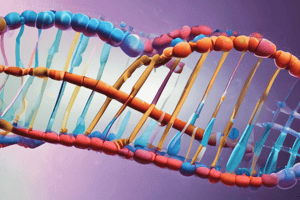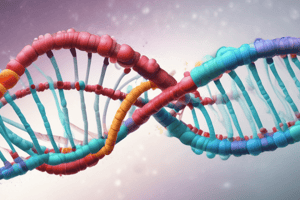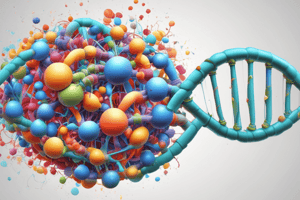Podcast
Questions and Answers
The smallest unit of heredity is a chromosome.
The smallest unit of heredity is a chromosome.
False (B)
DNA replication proceeds in one direction around the bacterial chromosome.
DNA replication proceeds in one direction around the bacterial chromosome.
False (B)
Repressible operons are normally turned on in the cell.
Repressible operons are normally turned on in the cell.
True (A)
Lactose is a corepressor in the lac operon.
Lactose is a corepressor in the lac operon.
Excised introns form structures called lariats.
Excised introns form structures called lariats.
Flashcards are hidden until you start studying
Study Notes
Heredity and Chromosomes
- Chromosomes are not the smallest unit of heredity; genes are the fundamental units.
- DNA polymerase adds nucleotides only at the 3' end of the growing strand, ensuring replication directionality.
DNA Replication and Transcription
- DNA replication around the bacterial chromosome occurs bidirectionally, not in one direction.
- Transcription, the process of synthesizing RNA from DNA, occurs in the nucleus for eukaryotes and at the nucleoid region in prokaryotes.
Translation and tRNA
- In bacteria, the initiator tRNA carries a modified form of methionine known as formyl methionine (fMet).
- Introns, non-coding sequences found within genes, have been suggested to have roles in gene regulation, contrary to the belief they are functionless.
RNA Processing
- During RNA splicing, excised introns can form lasso-like structures known as lariats.
Operons and Gene Regulation
- In the lac operon, lactose functions as an inducer, not a corepressor, to enable the expression of genes for lactose metabolism.
- Repressible operons are typically active and turned on in the cell until they are repressed by co-repressors.
Mutations and DNA Repair
- Induced mutations can arise from various sources, including chemical mutagens and radiation, rather than solely from errors in DNA replication.
- DNA photolyase is an enzyme that repairs DNA damage caused by ultraviolet light, but it requires visible light to function effectively.
Mutation Effects
- Not all mutations are beneficial; many can be neutral or harmful, affecting an organism's fitness in its environment.
Studying That Suits You
Use AI to generate personalized quizzes and flashcards to suit your learning preferences.




